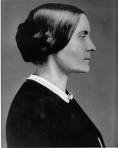
![]()
(1820-1906)
She was one of the founders of American feminism. For more than half a century, she endured threats and ridicule for her tireless quest to reform the unfair laws that governed women. Crisscrossing the country at a breathtaking pace well into her eighties, she gave speeches and supported rallies for women’s rights. She was arrested in 1872 for daring to vote -- an illegal act for a woman. A month before her death, she finished her last public appearance declaring “failure is impossible.” Fourteen years later, women were given the right to vote.
“Men: their rights and nothing more; women: their rights and nothing less.” - Susan B. Anthony
CARRY ON
(Words & music by Jonathan Sprout)
Alone on a platform, she stops mid-sentence.
In a room full of angry shouts, she clears her throat.
She patiently waits for the return of order.
And then repeats: "We are equal. Women deserve to vote."
A young energetic leader, she travels from town to town
Raising women's issues with a voice that must be heard.
Those accusations and insults hurt, but they don't keep her down,
'Cause she believes in the power and the truth of her spoken word.
REFRAIN: Carry on! Can you hear the call?
Carry on! Failure is impossible.
She drops a vote in a ballot box on Election Day,
Claiming she has the constitutional right.
But the judge tells the jury to see it another way.
And Susan B. Anthony loses another fight.
REFRAIN
She lived her life determined that women must unite.
She would not stop believing that equality is everybody's right.
REFRAIN
Her 86th birthday -- she's calm and self-possessed
Before a room packed with people making lots of noise again.
It's a standing ovation for a hero, the honored guest,
Who lived her life demonstrating women are equal to men.
REFRAIN
© 2000 Kanukatunes (ASCAP)
She traveled from county to county in New York and other states making speeches and organizing clubs for women's rights. She pleaded her cause with every president from Abraham Lincoln to Theodore Roosevelt.
Susan B. Anthony was also active in the temperance movement and a passionate abolitionist. When blacks were given the right to vote by the 15th Amendment, she launched a campaign to extend the same right to women. In 1869 she helped to organize the National Woman Suffrage Association.
In 1890 this group joined the American Woman Suffrage Association to form the National American Woman Suffrage Association. She became the president of the new association in 1892 and held this office until she was 80 years old.
In 1872 she voted in the presidential election to test her status as a citizen. For this act she was tried and fined $100, but she refused to pay the fine, declaring that "taxation without representation is tyranny."
At the time when Anthony began her work, women had few legal rights. Today, largely through her efforts and those of her associates, women have opportunities for higher education, the privilege of working at almost any occupation, the right to control their own property and children, the right to hold public office, and the right to vote. She lived to see many of these reforms put into effect. After she died in 1906, both major political parties endorsed a woman's right to vote. In 1920 the suffrage amendment to the Constitution was ratified. Finally, women were given the right to vote.
Men were in power in her day. Ms. Anthony helped to bring a balance to humanity by showing the world we’re all better off when we treat each other with fairness and equality. She clearly understood the imbalance of power and spent most of her adult life “making women as good as men.” She believed if enough people were aware of how much better life could be for boys & and girls, men & women when work, responsibilities and pleasures are evenly divided, then change would happen.
It simply made sense to Ms. Anthony that it would be for the benefit of all when women would be treated as equal to men. She was aware of this most of her life, having been brought up by thoughtful loving parents in a thoughtful loving Quaker community. Her clarity and awareness of the real issues at hand -- that women wouldn’t get anywhere in the battle for equality until they were given the right to vote -- helped guide her speeches and actions and create greater results for the goodness of all.
She must have thought: How can Americans live as though we are all equal when in fact only some of us are allowed to vote and make changes in government? Responsibility means all people having a say in the way we all live our lives. It was only fair and only responsible for women to be given the vote. True honesty should mean living up to the words of the Constitution, which Susan B. Anthony clearly believed she was doing as she attempted to vote in 1872.
Susan B. Anthony and Clara Barton first met on November 30, 1867 while changing trains in Cleveland, OH. It was the beginning of a long and productive relationship.
Miss Anthony was also good friends with Frederick Douglass (although there was a time when she didn’t care for his policies because he put the African-American cause before the Women’s Rights cause for a while.)
I visited the Susan B. Anthony house in Rochester, NY. It was great. Go and ask questions. See the room where she would do her writing. You can go upstairs and see the bedroom where she peacefully passed away.
Links:
The Susan B. Anthony House in Rochester, NY
Women’s Rights National Historic Park in Seneca Falls, NY
On A Woman’s Right to Vote: a speech given by Susan B. Anthony after she was arrested for attempting to vote
Not For Ourselves Alone: The Story of Elizabeth Cady Stanton & Susan B. Anthony, a PBS documentary


